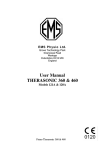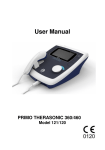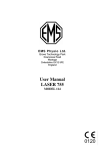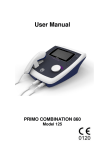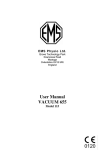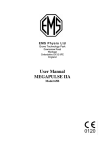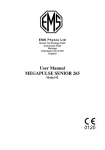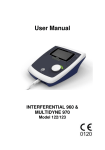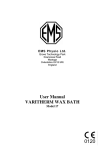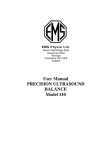Download User Manual THERASONIC 355 & 455
Transcript
E M S P h ys i o L td . Grove Technology Park Downsview Road Wantage Oxfordshire OX12 9FE England User Manual THERASONIC 355 & 455 Models 98 & 99 2 Therasonic 355 and 455 General Information This manual provides the necessary information for the installation and operation of the Therasonic 355 and 455 Units. These instructions must be studied before putting the unit into operation. The information contained in this manual is subject to change without notice. No part of this manual may be photocopied, reproduced or translated into another language without the prior written consent of EMS Physio Ltd. The Therasonic 355 and 455 units are single and dual frequency ultrasound therapy units. Both units may be mains only or mains/battery powered. Therapeutic ultrasound has been applied to a wide range of conditions with successful outcomes. These include acute and subacute traumatic and inflammatory conditions, chronic rheumatoid and arthritic conditions, scar and excessive fibrous tissue and for pain relief. It is intended that the Therasonic 355 and 455 units are only used by qualified healthcare professionals such as physiotherapists who have received training in electrotherapy. Record of Amendments ISSUE 1 2 3 4 5 6 7 8 COMMENTS Initial Issue Revised Revised Revised Revised EMC Tables added Protocols and Dose Algorithm added Revised Therasonic 355 and 455 DATE 27/02/2003 04/11/2003 09/02/2005 22/06/2006 01/10/2007 31/01/2008 31/03/2008 28/09/2010 3 EC Declaration of Conformity EMS Physio Ltd Grove Technology Park Downsview Road Wantage Oxfordshire OX12 9FE United Kingdom Declares that the following medical device is in conformity with the essential requirements and provisions of Council Directive 93/42/EEC and is subject to the procedure set out in Annex 2 of Directive 93/42/EEC under the supervision of Notified Body Number 0120, SGS United Kingdom Ltd. Product Name Therasonic 355 & 455 Model Numbers 99 & 98 Signature 4 Position Technical Director Date first issued 27th February 2003 Therasonic 355 and 455 Contents page 1 Title General Information 3 Record of Amendments 3 Declaration of Conformity to 93/42/EEC 4 Contents 5 Warranty 6 Introduction 7 Contraindications 9 Technical Specification 10 Controls and Markings 13 Installation 17 Operating Instructions 18 Protocols 27 Dose Algorithm 28 Maintenance 30 EMC Tables 31 Therasonic 355 and 455 5 Warranty This EMS Physio Ltd., (hereinafter called the company) product is warranted against defects in materials and workmanship for a period of two years from the date of shipment. The Company will at its option, repair or replace components which prove to be defective during the warranty period, provided that the repairs or replacements are carried out by the Company or its approved agents. The Company will consider itself responsible for the effects on safety, reliability and performance of the product:only if assembly operations, re-adjustments, modifications or repairs are carried out by persons authorised by it, only if the product is used in accordance with the instructions for use, only if the electrical installation of the relevant room complies with the appropriate national requirements. Should the product be returned to the Company for repair it must be sent carriage paid. Consumable items, for example, electrodes, electrode covers and batteries, are excluded from the above warranty. 6 Therasonic 355 and 455 Introduction Sound is mechanical vibration. The human ear responds to these vibrations in the range 20 Hz to 20 kHz. Sound above 20 kHz is called ultrasound. Therapeutic ultrasound is sound in the range 500 kHz to 5 MHz. Sound waves are produced by some disturbance in a material medium causing the particles or molecules of the medium to vibrate. For this reason sound will not pass through a vacuum. If the vibration is continuous and regular a constant tone or frequency is produced. The vibration or sound wave propagates through the medium as particles in the medium pass on their vibration to neighbouring particles and series of compressions and rarefactions are produced in the direction of travel of the wave. Therefore, sound waves are longitudinal waves. The diagram shows a sound wave travelling from left to right. The vertical bars represent thin slices of the medium which are displaced to form areas of compression and rarefaction. The sinewave represents their displacement relative to their mean position. The distance over which the vibration repeats itself is called the wavelength. The number of complete vibrations in one second is called the frequency of the sound wave. The velocity of sound in the medium is given by: Velocity = frequency x wavelength Therasonic 355 and 455 7 Sound will travel faster through media where the molecules are closer together and so the velocity is higher in solids than in liquids, and higher in liquids than in gasses. For example, the velocity of sound in stainless steel is approximately 5800 m/s, in water 1500 m/s and in air only 330 m/s. As the sound wave passes through the medium, causing molecules to vibrate, some of the energy in the wave is converted from kinetic energy to heat. For a collimated sonic beam the intensity, power per unit area, therefore, decreases exponentially with the distance travelled. The attenuation of the beam is also dependent upon the frequency of the sound. In solids the attenuation is proportional to frequency whereas in liquids the attenuation is proportional to the square of the frequency. The usual method of specifying the degree of attenuation of ultrasound in different media is by the half depth. The half depth is the distance the ultrasound must travel through the medium for its intensity to be reduced to one half of its original value. Many attempts have been made to measure the attenuation in various types of tissue with varying results. It is perhaps more important to remember which types of tissue have the highest absorption and which the lowest. With the lowest absorption first the order is, fat, muscle, skin, tendon, cartilage and bone. For soft tissue the half depth is around 50 mm at 1 MHz and 15 mm at 3 MHz. It is also important to remember that where there is a change in medium or tissue type there will be both reflection and refraction of the ultrasound beam. In particular, there is almost 100% reflection at the interface of a solid or liquid to air at therapeutic ultrasound frequencies. Any air bubbles in coupling medium will therefore reduce the effective intensity of the ultrasound. Also bone reflects a high percentage of incident ultrasound. It is important, therefore, when applying ultrasound to keep the transducer orthogonal to the surface of the treatment area, to keep the ultrasound transducer moving and to use a good coupling medium to avoid unwanted reflections and locally high intensities. 8 Therasonic 355 and 455 Contraindications Tumours, as ultrasound affects tissue repair and could therefore encourage growth Infections, due to the risk of spreading the infection Pregnancy, treatment over the pregnant uterus as ultrasound could affect rapidly dividing cells Radiotherapy, sites that have received radiotherapy treatment during the last six months Thrombosis and impaired circulation. Areas of impaired sensation Haemorrhage, due to the risk of increased bleeding, including recently controlled bleeding and haematoma. Haemophilia Implanted devices such as cardiac pacemakers should be avoided due to the possibility of affecting their operation. Also some plastics used in replacement surgery may be affected by absorption of ultrasound energy. Metal implants may lead to reflections, and as a precaution low doses of ultrasound should be used near these. Extreme care should be taken when treating areas near the eye because of the danger of damage to the retina. Similarly, extreme care should be taken near the ears and reproductive organs Therasonic 355 and 455 9 Technical Specification General Power Input Battery (optional) Classification (EN60601-1) Mains Fuses Size (height x width x depth) Weight Treatment Programs Protocols (optional) Dose Algorithm (optional) Ultrasound Frequency Maximum Intensity Maximum Output Power Output Modes Pulse Duration Treatment Timer Contact Monitor 100-240 Vac 50/60 Hz Internal Rechargeable (NiMh) Class 1, Type BF 2 x T630 mA (5 x 20 mm) 100 x 240 x 210 mm 2.2 kg (excluding battery) 10 user-defined set-ups 14 treatments Calculates treatment settings from entered parameters. 1.1 MHz ±5% and 3.4 MHz ±5% 1.5 W/cm2 in CW 3.0 W/cm2 in pulsed modes 6 W average (Mains operation only) CW and pulsed 1:1, 1:2, 1:4 and 1:9 2 ms 0 to 30 minutes* (treatment linked) Light on transducer Large Ultrasound Transducer ERA 4 cm2 BNR <5 Beam Type Collimated Small Ultrasound Transducer ERA BNR Beam Type 1MHz 0.6 cm2 <5 Divergent 3MHz 0.4 cm2 <5 Collimated Transducers for use with the Therasonic 355 and 455 are fully interchangeable and suitable for underwater treatment (IPx7 rated). * Prior to firmware version 1.12, the maximum treatment time was 20 minutes 10 Therasonic 355 and 455 The Therasonic 355 and 455 are designed to operate from any 50/60 Hz single phase supply between 100 and 240 Vac capable of supplying 50 VA. Connection is via an IEC socket at the rear of the unit. All information on model, serial number, and month/year of manufacture is located on the rear panel. Each Therasonic 355 or 455 is supplied with a detachable mains cable, spare fuses, a 4 cm2 treatment head, 180ml bottle of Therasonic coupling medium and this manual. The Therasonic 355 and 455 have been designed to meet the requirements of BS EN 60601-1:1990 (BS5724:Part 1:1989) "Medical Electrical Equipment, Part 1:General requirements for Safety", BS EN 601-2-5:2000 "Medical Electrical Equipment, Part 2.5 Particular requirements for the safety of ultrasonic physiotherapy equipment" Pulse Off Mode Frequency Time 1:1 250 Hz 2 ms 1:2 166 Hz 4 ms 1:4 100 Hz 8 ms 1:9 50 Hz 18 ms The pulse width is fixed at 2 ms Duty Cycle 50% 33% 20% 10% Therasonic 355 and 455 Temporal peak to average ratio 2:1 3:1 5:1 10:1 11 Environmental Conditions for Transport and Storage Temperature -10 to +35 C Relative Humidity 5 to 95% Atmospheric Pressure 500 to 1060 hPa Output Display The Therasonic 355 and 455 display shows the temporal-peak spatial-average ultrasound intensity and optionally the temporalaverage power or the temporal-peak power as selected Accessories Catalogue Number SLA9120 SLA9130 SLA9150 SLA9160 EMS502 EMS502A EMS502B EMS525 EMS157 EDC320 Description Large Dual-frequency Transducer Small Dual-frequency Transducer Large Angled Dual-frequency Transducer Combination Therapy Lead EMS Coupling Medium (12 x 170ml bottles) EMS Coupling Medium 1litre bottle Dispenser Pump for 1 litre bottles SoLo Shoulder Bag SoLo Treatment Trolley Protocol and Dose Algorithm Software Supplied with each unit is a detachable mains lead complete suitable for the country to which it is delivered. Replacement or additional mains leads are shown below. EMS Part Number 6-85 6-112 6-119 Description UK mains lead European mains lead North America mains lead For other countries contact EMS Physio Ltd. or the agent from whom the unit was purchased. 12 Therasonic 355 and 455 Controls and Markings Therasonic 355 and 455 front panel IEC Symbol 348 Attention, consult accompanying documents IEC Symbol 878-01-36 Input IEC Symbol 878-02-03 Type BF Equipment IEC Symbol 878-01-37 Output Output Socket The output socket is for connection of the ultrasound transducer The stimulation input is internally connected to the face of the ultrasound transducer and is intended for combination therapy. Any stimulator connected to the socket must be classified as type BF according to EN 60601-1 for continued safety. A suitable connecting lead is available from EMS Physio Ltd. The infrared window is for the IrDA interface used for service and calibration purposes. Therasonic 355 and 455 13 Therasonic 355 and 455 rear panel Model number and classification CE mark showing conformity to 93/42/EEC Description of ultrasound output waveform for each mode Name and address of manufacturer Ultrasound symbol according to Health and Welfare Canada safety code 23 Ultrasound frequency, rated output and intensity Do not dispose of as unsorted waste (2006/96/EC WEEE Directive) IEC symbol 348 Attention, consult accompanying documents Serial number and date of manufacture Mains connection is via the IEC socket on the right of the rear panel. Details of the required mains supply are above the connector. 14 Therasonic 355 and 455 Therasonic 355 and 455 top LCD up and down keys Power key IEC Symbol 848-01-05 Stand-by IEC Symbol 848-01-26 variability in steps Power indicator Therasonic 355 and 455 menu key Control knob 15 Large Transducer Treatment Light Active face Small Transducer Treatment Light Active face The ultrasound transducers are calibrated independently from the Therasonic 355 and 455 and are fully interchangeable. 16 Therasonic 355 and 455 Installation Upon receipt, check for any visible damage which may have occurred in transit. If any signs of damage are found then retain all packing material and inform the carrier and the Company or its agent from whom the unit was purchased. If not already fitted, connect a suitable plug to the mains cable. The plug must have provision for an EARTH (GROUND) connection. The mains cable has the following colour code: BROWN is LIVE (LINE), BLUE is NEUTRAL and GREEN/YELLOW is EARTH. The Therasonic 355 and 455 units must only be connected to a mains supply with a protective earth conductor. If the integrity of the earth connection is in doubt, do not connect the unit to the mains supply. Units fitted with an internal rechargeable battery may be used powered by the battery only. The Therasonic 355 and 455 units are supplied with a large (4 cm2) transducer. An optional small transducer is available for the Therasonic 455. Plug the transducer into the output socket on the front of the unit. The plug has a raised square section on the top to ensure that it cannot be inserted incorrectly. Push the transducer into the holder adjacent to the handle at the rear of the unit. Operation of the unit in close proximity (less than 1 metre) to shortwave therapy equipment or radio-frequency mobile communication equipment could result in the ultrasound output of the Therasonic 355 or 455 being affected. Therasonic 355 and 455 17 Operating Instructions Mains Operation Connect the mains cable to the IEC socket on the rear of the unit and to a suitable power outlet. The unit will turn on in stand-by mode indicated on the LCD and the power indicator on the top panel will flash every 2 seconds. Mains only units will indicate that there is no battery fitted. Mains / battery units will show the estimated battery capacity left and whether the battery is being charged. Mains only unit Mains / battery unit If the unit is left in stand-by mode for longer than 5 minutes then the LCD will be turned off to save power, but the power indicator will continue to flash. If there is a battery installed, the unit will continue to monitor and if necessary charge the battery. The LCD can be restored by pressing any key or moving the rotary control. To turn on the unit press the power key. Battery Operation For battery operation (mains / battery units only) press the power key and hold it down until the EMS logo appears on the LCD. The power key should then be released. 18 Therasonic 355 and 455 Power on sequence and general information When the Therasonic 355 / 455 is turned on, the EMS company logo is displayed on the LCD followed by the model (Therasonic 355 or Therasonic 455). The unit will then give a short beep and display the information screen showing the model number and software version. Logo and model Information screen After approximately 3 seconds the unit will give another short beep and display the main ultrasound set-up screen (unless the Protocol and Dose Algorithm software is installed – see page 27 of this manual) Ultrasound set-up screen (455) Ultrasound set-up screen (355) At the bottom of the screen is the status bar. The left side of the status bar shows the current power source. Battery power Mains power Therasonic 355 and 455 19 The right side shows the battery status. If the unit has a battery installed then the status bar shows an estimate of the remaining battery capacity. Battery not installed Battery capacity 99% Battery capacity 93% and charging Standard key functions Throughout the operation of the Therasonic 355 and 455, the up and down keys are used to select the parameter highlighted. The rotary control is used to increase and decrease the highlighted parameter. The menu key is used to exit from the current screen or to select the menu option highlighted. 20 Therasonic 355 and 455 Ultrasound set-up The ultrasound set-up for the Therasonic 355 and 455 is the same except that the 455 has the option to change the ultrasound frequency. Ultrasound set-up screen (455) Ultrasound set-up screen (355) Treatment Time: When the ultrasound set-up screen is first displayed the clock symbol is highlighted. With the clock symbol highlighted, turn the rotary control clockwise to increase the time and anticlockwise to decrease the time. The time can be set in 30s intervals. Frequency (455 only): When the freq label is highlighted turning the rotary control clockwise selects 3 MHz operation and anticlockwise selects 1MHz operation. Mode: The Therasonic 355 and 455 units provide both continuous wave and pulsed ultrasound. When the mode label is highlighted, turning the rotary control clockwise increases the pulse ratio and anticlockwise decreases the pulse ratio. Power: The displayed output power may be the temporal-peak power or the temporal-average power. In continuous mode these are the same but for pulsed modes the temporal-average power is the temporal peak power multiplied by the duty cycle of the pulse. When the power label is highlighted turning the rotary control clockwise selects temporal-average power and anticlockwise selects temporal-peak power. Therasonic 355 and 455 21 Treatment It is recommended that before commencing treatment, the stainless steel front of the transducer is disinfected using a 70% v/v aqueous solution of isopropyl alcohol. Sterile alcohol wipes are suitable for this purpose. Apply sufficient coupling medium to the area to be treated: EMS Therasonic coupling medium is recommended. Apply the active face of the transducer to the treatment site via the coupling medium. Using the up and down keys, highlight the output symbol on the ultrasound set-up display. Turn the rotary control clockwise to start treatment. The output intensity will increase in 0.1 W/cm2 steps. The treatment indicator on the transducer will light, the output symbol on the LCD will flash and the treatment time will begin to count down. Move the transducer over the treatment site in small circular paths whilst setting the output intensity to the required level using the rotary control. If the transducer is not connected to the output socket or the treatment time is zero then the unit will give a one second beep and the output will not be energised. Always keep the face of the transducer in contact with the treatment area and always keep the transducer moving to avoid any standing waves. If the transducer face is lifted from the treatment site or if for any reason there is insufficient contact between the transducer and the treatment site for more than two seconds, the power applied to the transducer will also be reduced to a low level. The treatment light on the transducer will turn off, the treatment time will cease to count 22 Therasonic 355 and 455 down and the output intensity display will flash, indicating that the required output cannot be delivered. When good contact is restored, the treatment indicator on the transducer will light, the output display will cease to flash and the timer will continue to count down. If the output intensity is returned to zero using the rotary control, before the treatment time has elapsed, the display will show the treatment time remaining. When the intensity is increased again the treatment will continue. When the treatment time reaches 00:00, treatment is terminated. The intensity and power displays will go to zero, ultrasonic power from the transducer will be turned off, the treatment indicator will turn off and the unit will give a one second beep. Remove the transducer from the treatment site, wipe off any coupling medium and return the transducer to the holder at the rear of the unit. Remove the remaining coupling medium from the treatment site. The transducers are also suitable for treatment using a water bath. This is especially useful when treating areas which are not uniform such as feet or hands. When using a water bath it is advisable to use degassed water (water that has been boiled to remove any air and then allowed to cool). After the part of the body has been immersed in the water, remove any air bubbles that may have accumulated on the skin. Set up the treatment parameters and then immerse the transducer in the water before turning the output on. Hold the transducer with its face approximately 1 cm away from the treatment site and using the rotary control set the required intensity remembering to keep the transducer moving in small circular paths to prevent standing waves. At the end of the treatment turn off the output control, remove the transducer from the water and dry both it and the area treated. Therasonic 355 and 455 23 System menu Pressing the menu key from the ultrasound set-up screen takes the user to the system menu. (Units with The Protocol and Dose Algorithm software installed will show a different screen here – see page 27 of this manual). Highlight the required option using the up and down keys and then press menu. The ultrasound option returns to the ultrasound set-up screen. User programs The Therasonic 355 and 455 units can store up to 10 user defined set-ups. To access the user programs select the option from the system menu. The LCD shows the 10 user programs as file cards with the first program at the front. To move through the program cards use the rotary control. On entry to the user program display the Load option is highlighted. To load the displayed program press the menu key. The settings shown on the file card will be loaded and the user will be returned to the ultrasound set-up screen. If an empty card is selected the unit will give a short beep and no action will be taken. To save the current ultrasound screen set-up as a user program, select the card to which the set-up is to be saved using the rotary control. Highlight the Save option using the up and down keys and press the menu key. The settings will be saved and displayed on the selected card. To erase a program saved on the current card, highlight the Erase option using the up and down keys. Pressing the menu key will erase 24 Therasonic 355 and 455 the program. “Not Used” will be displayed on the selected card to confirm the action. Select the Quit option to return to the system menu Set-up The set-up option is accessed from the system menu. This option allows user preferences to be set for LCD contrast, sounder volume, key-click, language and contact monitor. Contrast: When the contrast label is highlighted turning the rotary control clockwise makes the LCD darker and anticlockwise makes it lighter. Volume: There are two volume levels for the sounder. When volume is highlighted, turning the rotary control clockwise sets high and anticlockwise sets low. Key-click: When key-click is highlighted turning the rotary control clockwise sets the key-click on and an short beep is produced each time a key is pressed. Turning the rotary control anticlockwise turns the key-click off. Language: When language is highlighted, the rotary control changes the current display language. Contact: The ultrasound contact monitor can be set to produce an audible alarm when there is insufficient contact for the correct ultrasound power to be delivered. In this option turning the rotary control clockwise sets the contact monitor to audible and turning it anticlockwise sets the monitor to standard (no audible alarm). To exit set-up press the menu key. Therasonic 355 and 455 25 Combination Therapy Any stimulator used with the Therasonic 355 or 455 for combination therapy must be Type BF (EN60601-1) for continued safety. Attach a suitable electrode to the patient near the treatment site and connect it to one output from the 2-way cable from the stimulator. Connect one end of the combination therapy lead (SLA160) to the stimulator input on the front of the Therasonic 355 or 455 and the other to the remaining output on the 2-way cable of the stimulator. It is recommended that only the large transducer is used for combination therapy in order to maintain sufficient contact area to keep the stimulator current density to a safe level. Set up both the ultrasound and the stimulator ready for treatment. The stimulator treatment time should be set slightly longer than that for the ultrasound. If the stimulator has an electrode monitor it should be disabled. Apply coupling medium to the treatment site and position the ultrasound transducer on patient so that the lesion point is between the stimulator electrode and the ultrasound transducer. Turn on the stimulator output and slowly increase the intensity until the patient just feels the normal 'tingling' sensation associated with the modality. Turn on the ultrasound output. The patient may feel a slight increase to the sensation. Increase the ultrasound intensity to the required level. Move the ultrasound transducer towards the lesion area making sure that there is always coupling medium between the face of the transducer and the skin. When directly over the lesion, the patient will feel increased sensation - this is the centre of the lesion. Treat with ultrasound and stimulation for the remaining time set. 26 Therasonic 355 and 455 Protocols and Dose Algorithm Software (optional accessory) If this optional software is installed (firmware versions 1.30/1.04 or higher) this system menu screen will appear after power-up. Pressing the menu key with Ultrasound highlighted will access the Ultrasound set-up page. The up/down keys may be used to select the other options – User Programs and Set-up as described above and the extra two options of Protocols and the Dose Algorithm. Protocols Highlighting Protocols in the system menu window and pressing the menu button will bring up the protocol selection screen. The various different treatment protocols can be selected by turning the rotary dial. Pressing the menu key will load the treatment settings for the selected protocol. Note that the maximum available intensity will be preset for each protocol to the recommended level for that treatment. Before commencing treatment (by incrementing the output intensity) it is possible to edit the settings if required (except for output intensity). It is also possible to store an edited version of a protocol as a user program, by pressing the menu key, selecting User Programs and then selecting the program number and the Save option. Upon re-loading these settings from a user program, it will be found that the maximum intensity is no longer preset. Therasonic 355 and 455 27 Dose Algorithm From the System Menu screen, scrolling to Dose Algorithm and pressing the menu button produces this screen:The lesion depth in cm can be changed using the rotary control. If an Ultrasound transducer is not connected this prompt screen will appear:- Plugging in an Ultrasound head at this point will cause a return to the Lesion Depth display. Set the required lesion depth and press the menu button. This next screen will appear:- 28 Therasonic 355 and 455 Select the relevant state using the rotary control and press the menu button. This final screen will appear:- After adjusting the treatment area using the rotary control press the menu button and the algorithm will calculate and display the treatment settings for that particular set of input parameters. The maximum available intensity will also be automatically set to the value calculated by the dose algorithm. Again, it is possible to edit and/or store these settings as described above in the protocols section. Increment the output intensity to begin treatment. Therasonic 355 and 455 29 Maintenance The ultrasound transducers may be disinfected using a 70% v/v aqueous solution of isopropyl alcohol. They are NOT suitable for steam sterilisation or for disinfectants containing sodium hypochlorite. N.B. Isopropyl alcohol is flammable and should be kept away from naked flames. Isopropyl alcohol must not be brought into contact with eyes or mouth. The unit may be cleaned by wiping over with a damp cloth. The use of abrasive materials and cleaning solvents should be avoided. Regularly (at least monthly) inspect all treatment leads, cables and connectors for signs of damage. The ultrasonic output power should be checked at least annually. The mains fuses are located on the rear panel in a compartment below the mains inlet. The compartment cannot be opened unless the mains lead is removed from the IEC socket. Information on fuse type and rating is given on the rear panel of the unit and in the Technical Specification section of this manual. If the mains fuses continue to blow then EMS Physio Ltd. qualified Service personnel must be called in. The Therasonic 355 and 455 have the option of an internal NiMh rechargeable battery. Whenever the unit is connected to the mains supply the battery is monitored and charged as necessary. This type of battery has a limited life (typically 500 charge / discharge cycles). This battery must only be replaced by authorised service personnel. Do not mutilate, puncture, or dispose of batteries in fire. The batteries can burst or explode, releasing hazardous chemicals. Discard used batteries according to the manufacturer’s instructions and in accordance with your local regulations. There are no user serviceable parts inside the unit and it should not be opened. Full servicing instructions are available on request. 30 Therasonic 355 and 455 EMC Tables 1 2 3 4 6 7 8 Guidance and manufacturers declaration – electromagnetic emissions The Solo Therasonic 355/455 is intended for use in the electromagnetic environment specified below. The customer or the user of the 355/455 should assure that it is used in such an environment. Electromagnetic environment Emissions Test Compliance guidance The 355/455 uses RF energy only for its internal function. Therefore, its RF RF emissions Group 1 emissions are very low and are not CISPR 11 likely to cause any interference in nearby electronic equipment. RF emissions Class A CISPR 11 Harmonic not The 355/455 is suitable for use in all emissions applicable establishments other than domestic and IEC 6100-3-2 those directly connected to the public low-voltage power supply network that Voltage supplies buildings used for domestic fluctuations not purposes. Flicker emissions applicable IEC 61000-3-3 Therasonic 355 and 455 31 Guidance and manufacturers declaration – electromagnetic immunity The Solo Therasonic 355/455 is intended for use in the electromagnetic environment specified below. The customer or the user of the 355/455 should assure that it is used in such an environment. Electromagnetic IEC 60601 Immunity test Compliance level Environment test level guidance Floors should be wood, Electrostatic concrete or ceramic tile. ±6 kV contact ±6 kV contact discharge If floors are covered with synthetic material, the (ESD) ±8 kV air ±8 kV air IEC 61000-4-2 relative humidity should be at least 30%. ±2 kV for ±2 kV for power supply power supply Mains power quality Electrical fast lines lines should be that of a transient/burst typical commercial or ±1 kV for ±1 kV for input/output IEC61000-4-4 hospital environment. lines input/output lines ±1 kV differential Mains power quality Surge mode should be that of a ±1 kV differential mode ±2 kV common mode typical commercial or ±2 kV IEC61000-4-5 hospital environment. common mode <5% UT (>95% dip in UT) For 0,5 cycle Voltage dips, short interruptions and voltage variations on power supply input lines IEC 61000-4-11 40% UT (60% dip in UT) For 5 cycles 70% UT (30% dip in UT) For 25 cycles <5% UT (>95% dip in UT) For 5 sec <5% UT (>95% dip in UT) For 0,5 cycle 40% UT (60% dip in UT) For 5 cycles 70% UT (30% dip in UT) For 25 cycles <5% UT (>95% dip in UT) For 5 sec Mains power quality should be that of a typical commercial or hospital environment. If the user of the 355/455 requires continued operation during power mains interruptions, it is recommended that the 355/455 be powered from an uninterruptible power supply or a battery. Power frequency magnetic field should be at levels characteristic of 3 A/m 3 A/m a typical location in a typical commercial or hospital environment. NOTE UT is the a.c. mains voltage prior to application of the test level. Power frequency (50/60 Hz) Magnetic field IEC 61000-4-8 32 Therasonic 355 and 455 Guidance and manufacturers declaration – Electromagnetic immunity. The Solo Therasonic 355/455 is intended for use in the electromagnetic environment specified below. The customer or user of the Solo Therasonic 355/455 should assure that it is used in such an environment. Immunity Test IEC 60601 Test level Compliance level Electromagnetic Environment Guidance Portable and mobile RF communications equipment should be used no closer to any part of the Solo Therasonic 355/455 including cables, than the recommended separation distance calculated from the equation applicable to the frequency of the transmitter. Recommended separation distance Conducted RF IEC61000-4-6 3Vrms 150kHz to 80MHz 3V Radiated RF IEC61000-4-3 3V/m 3V/m 80MHz to 2.5GHz d=3.5√P/V1 d=3.5√P/E1 80MHz to 800MHz d=7√P/E1 800MHz to 2.5GHz where P is the maximum output power rating of the transmitter according to the manufacturer and d is the recommended separation distance in metres (m). Field strengths from fixed RF transmitters, as determined by an electromagnetic site surveya should be less than the compliance level in each frequency rangeb. Interference may occur in the vicinity of equipment marked with the following symbol: NOTE 1 At 80MHz and 800MHz the higher frequency range applies. NOTE 2 These guidelines may not apply in all situations. Electromagnetic propagation is affected by absorption and reflection from structures, objects and people. a Field strengths from fixed transmitters, such as base stations for radio (cellular/cordless) telephones and land mobile radios, amateur radio, AM and FM radio broadcast and TV broadcast cannot be predicted theoretically with accuracy. To assess the electromagnetic environment due to fixed RF transmitters, an electromagnetic site survey should be considered. If the measured field strength in the location in which the Solo Therasonic 355/455 is used exceeds the applicable RF compliance level above, the Solo Therasonic 355/455 should be observed to verify normal operation. If abnormal performance is observed additional measures may be necessary, such as re-orienting or relocating the Solo therasonic 355/455. b Over the frequency range 10kHz to 80Mhz, field strengths should be less than 3 V/m. Therasonic 355 and 455 33 Recommended separation distances between portable and mobile RF communications equipment and the Solo Therasonic 355/455 The Solo Therasonic 355/455 is intended for use in an electromagnetic environment in which radiated RF disturbances are controlled. The customer or user of the 355/455 can help prevent electromagnetic interference by maintaining a minimum distance between portable and mobile RF communications equipment (transmitters) and the Solo 355/455 as recommended below, according to the maximum output power of the communications equipment. 150kHz to 80MHz d=3.5√P/V1 80MHz to 800MHz d=3.5√P/E1 800MHz to 2.5GHz d=7√P/E1 0.01 0.12 0.12 0.23 0.1 0.38 0.38 0.73 1 1.2 1.2 2.3 10 3.8 3.8 7.3 100 12 12 23 For transmitters rated at a maximum output power not listed above, the recommended separation distance d in meters (m) can be estimated using the equation applicable to the frequency of the transmitter, where P is the maximum output power rating in watts (W) according to the transmitter manufacturer. NOTE 1 At 80MHz and 800MHz the separation distance for the higher frequency range applies. NOTE 2 These guidelines may not apply in all situations. Electromagnetic propagation is affected by absorption and reflection from structures, objects and people. 34 Therasonic 355 and 455 Essential Requirements Power Input Ultrasound Frequency Maximum Intensity Maximum Output Power Output Modes Pulse Duration Treatment Timer Large Transducer Small Transducer 100-240V ac 1.1 MHz ±5% and 3.4 MHz ±5% 1.5 W/cm2 (±20%) in CW 3.0 W/cm2 (±20%) pulsed modes 6 W (±20%) average CW and pulsed 1:1, 1:2, 1:4 and 1:9 2 ms (±10%) 0 to 30 minutes ERA 4cm2 (±20%) (IEC61689), collimated BNR<5 ERA 0.6cm2 (±20%) (IEC61689), divergent at 1MHz ERA 0.4cm2 (±20%) (IEC61689), collimated at 3MHz BNR<5 Therasonic 355 and 455 35



































